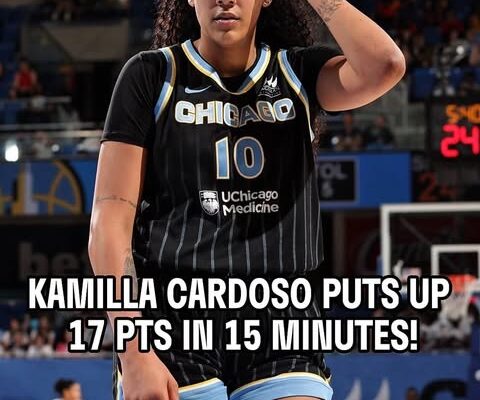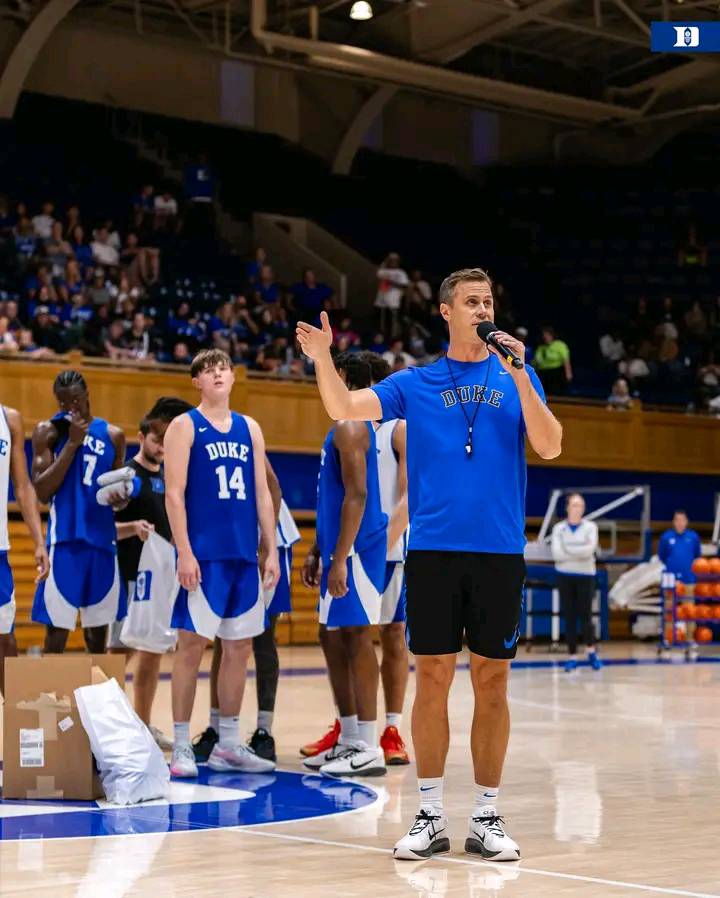Kamilla Cardoso controlled the paint with authority in just 15 first-half minutes against the Mercury!
Kamilla Cardoso’s impact on the game against the Phoenix Mercury was nothing short of spectacular, and she didn’t even need a full half to make her presence felt. In just 15 minutes of action during the first two quarters, the 6-foot-7 Chicago Sky rookie center put on a dominant display in the paint that left spectators, commentators, and opposing players alike in awe. Her performance didn’t just showcase her individual talent—it underscored why many believe she is destined to become one of the most powerful interior forces in the WNBA for years to come.
From the moment she stepped on the court, Cardoso set the tone with her size, strength, and skill. The Mercury, already struggling with size mismatches in previous games, had no answer for the towering Brazilian. She established deep post position with ease, muscled her way to the basket, and altered the rhythm of the Mercury’s offense and defense. Whether it was blocking shots, grabbing offensive rebounds, or scoring on putbacks and drop-steps, Cardoso was everywhere in the paint, and she made every second count.
Cardoso’s footwork stood out early, as she quickly maneuvered into prime scoring positions with agility that belies her frame. She showed off her repertoire with a mix of up-and-under moves, smooth baby hooks, and hard drives to the rim that forced the Mercury to either foul or concede easy buckets. Even when double-teamed, her poise with the ball allowed her to make quick, intelligent decisions—either passing out to an open shooter or repositioning to finish strong at the rim. It wasn’t just brute strength; it was calculated, skillful execution.
On the defensive end, Cardoso’s impact was arguably even more impressive. Her presence alone altered Phoenix’s shot selection. Guards driving into the lane often had second thoughts when they saw her lurking near the rim. Several times, she forced missed shots just by standing her ground and using her wingspan to deter even the thought of a layup attempt. She recorded multiple blocks during that 15-minute stretch, but even those numbers didn’t tell the full story. There were at least twice as many shots that were rushed, redirected, or entirely abandoned because Cardoso was there. Her ability to close space so quickly is rare, even in the WNBA, and it gave the Sky a major edge.
Rebounding was another area where Cardoso exerted her will. She pulled down a flurry of boards on both ends of the court, often outmuscling two or three defenders in traffic. Her timing on rebounds was impeccable—she anticipated where the ball would land and positioned herself accordingly. Offensive rebounds often led directly to second-chance points, and she used these opportunities to extend possessions and demoralize the Mercury defense. Defensive rebounds, on the other hand, kickstarted transition plays that helped Chicago establish a faster tempo and create spacing opportunities on the other end.
What makes Cardoso’s early dominance all the more impressive is the efficiency with which she executed everything. She didn’t force shots or get caught trying to do too much. Instead, she played within the rhythm of the game, reading the defense, exploiting weaknesses, and letting her natural talent flow through the structure of Chicago’s game plan. She moved well off the ball, set hard screens to open up teammates, and hustled back on defense after every offensive set. Her energy and commitment to both ends of the floor elevated the entire team’s intensity.
Cardoso’s chemistry with the Sky guards was also evident. Time and again, pick-and-roll plays saw her dive to the basket with perfect timing, receiving precise bounce passes or lobs in stride. Her hands were reliable, and her finishes were emphatic. The trust between Cardoso and her teammates is clearly growing with each game, and it was on full display during that first half against Phoenix. They looked for her early and often, and she rewarded them with one of the most commanding stretches of play in the game.
This performance wasn’t a flash in the pan—it was the continuation of a trend that’s been building throughout her young professional career. Cardoso, a standout at South Carolina before joining the WNBA, has been steadily adjusting to the pace and physicality of the league. But if this game was any indication, she’s no longer adjusting—she’s asserting. She’s finding her rhythm and establishing herself as one of the league’s most dangerous bigs, and the Mercury found that out the hard way.
The way Cardoso dominated also speaks to the evolution of the modern post player. She’s not just a back-to-the-basket bruiser; she’s mobile, fluid, and capable of switching defensively onto smaller players without being exposed. Her lateral quickness allowed her to hedge on screens and recover, giving Chicago’s defense a dynamic versatility. This kind of two-way play is a hallmark of elite bigs in today’s game, and Cardoso is showing that she has all the tools to join that upper echelon.
As the first half wore on, it became clear that Phoenix had no adjustments that could slow her down. They tried fronting her in the post, doubling her on the catch, and collapsing from the weak side—but none of it worked. If anything, those strategies only opened up the floor for her teammates, allowing Chicago to score from multiple areas while still funneling their offense through Cardoso. It was a nightmare scenario for the Mercury: overcommit and risk giving up open perimeter shots, or play her straight up and watch her feast inside.
By halftime, the box score painted a partial picture of her dominance. She had tallied double-digit points, pulled down a healthy number of rebounds, and swatted away a handful of shots. But the true measure of her performance came from watching how the Mercury adjusted their entire game plan just to deal with her—and still couldn’t stop her. She dictated the terms of engagement every time she was on the floor, and that kind of control is something only the league’s most dominant players can exert.
It’s also worth noting the emotional lift Cardoso gave to her team. Every big block, every tough rebound, every powerful finish seemed to ignite the Sky bench. Her teammates were up on their feet, feeding off her energy. That kind of presence—where one player’s performance can raise the morale and intensity of the entire squad—is rare. It’s leadership by action, and for a rookie, it’s especially impressive.
Off the court, Cardoso carries herself with humility and a team-first mindset. But on the court, she’s a warrior, and the Mercury felt the full weight of that intensity in just 15 short minutes. Her teammates trust her, her coaches rely on her, and now the rest of the league is learning just how hard it is to stop her when she gets going. The WNBA has no shortage of talented bigs, but Cardoso’s blend of size, skill, and intelligence is already separating her from the pack.
Her first-half domination served as a microcosm of what she can bring to Chicago long-term. If she can maintain this level of play and continue to grow her game, there’s little doubt she’ll be a perennial All-Star and potentially an MVP candidate in the future. She’s still early in her career, but the ceiling is sky-high, and she’s already starting to break through it.
There’s also something poetic about how efficiently she worked. In an age where minutes and rest are closely monitored, Cardoso showed that it doesn’t take 30 or 40 minutes to make a statement. Her 15-minute first-half masterpiece sent a loud and clear message—not just to Phoenix, but to the entire WNBA. Kamilla Cardoso has arrived, and she’s here to dominate.
As the second half approached, all eyes remained on her. Would she continue her rampage? Would Phoenix find any answers? No matter what came next, those first 15 minutes had already written a powerful narrative. One of poise, power, and promise. One that Chicago fans will remember and opponents won’t soon forget. Kamilla Cardoso didn’t just play well—she took over. And she did it all before halftime.



